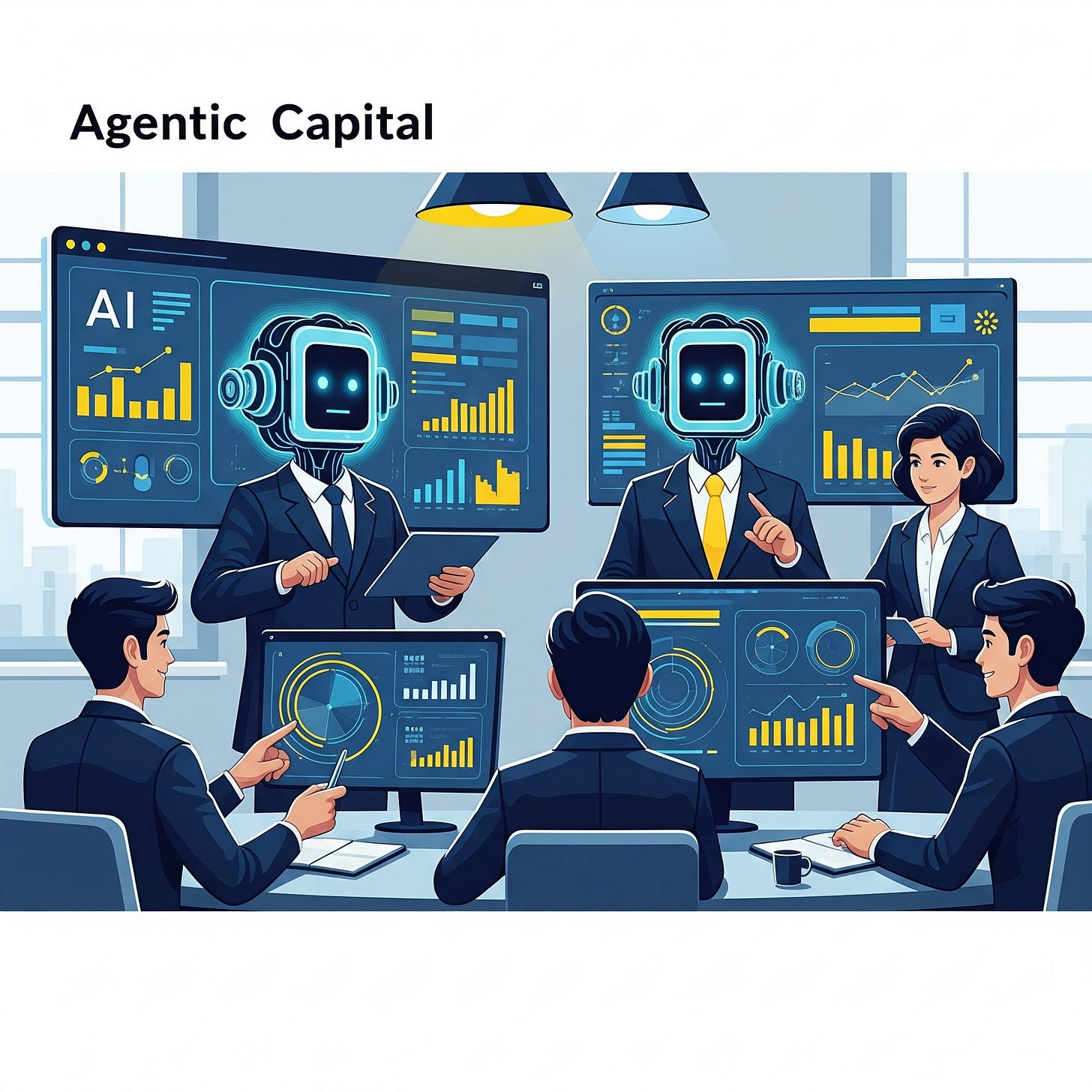The AI Revolution in Venture Capital: Transforming Back-End Processes
The Emergence of Agentic AI models in the VC/Startup ecosystem
Life Framework: The Paradox of Choice
One of the most thought-provoking paradoxes of modern life is the Paradox of Choice. Illuminated by psychologist Barry Schwartz, this idea reveals a subtle truth: while the freedom to choose is fundamental to our sense of autonomy and happiness, an overabundance of options can quietly erode our peace of mind.
Key Insights:
Too Many Choices, Less Satisfaction: When confronted with a dizzying array of possibilities, we often feel overwhelmed. The sheer volume can make it harder to decide, and sometimes, we end up making no decision at all.
Decision Fatigue: Sifting through countless alternatives demands mental energy. Over time, this can leave us feeling depleted and less content with whatever choice we eventually make.
The Shadow of Regret: The more options we have, the more we worry about missing out on the “perfect” one. This fear can linger, leading us to second-guess ourselves and wonder if we might have chosen better.
In a world that celebrates limitless possibility, the Paradox of Choice gently reminds us that sometimes, less truly is more.
The Evolution of AI in Venture Capital Back-End Processes
The Transformation Timeline: From Manual to Agentic
The venture capital industry has undergone a seismic shift in how deals are evaluated, executed, and managed. What once required armies of analysts and weeks of manual research can now be accomplished in hours through sophisticated AI systems.
Phase 1: Traditional VC Operations (2010-2018)
Manual Due Diligence: 40-60 hours per deal
Spreadsheet-Heavy Analysis: Error-prone financial modeling
Human-Only Decision Making: Gut instinct + limited data
Paper-Based Documentation: Slow deal execution
Phase 2: Early AI Adoption (2019-2021)
Basic Automation: Document parsing and data extraction
Predictive Analytics: Simple pattern recognition
CRM Integration: Automated deal tracking
Digital Workflows: Cloud-based collaboration
Phase 3: The Agentic AI Era (2022-Present)
Autonomous Research: AI agents conducting comprehensive market analysis
Intelligent Due Diligence: Multi-modal analysis across text, financial, and market data
Predictive Deal Scoring: ML models evaluating success probability
Automated Documentation: AI-generated term sheets and legal documents
Current State of AI in VC Back-End Processes
Due Diligence Revolution
Market Research & Competitive Analysis
Before: 15-20 hours of manual research per company
Now: AI agents analyze 1000+ competitors in 30 minutes
Impact: 95% time reduction, 300% increase in data comprehension
Financial Analysis
Traditional Method: Manual spreadsheet modeling
AI-Enhanced: Automated financial projections with scenario modeling
Result: 80% reduction in modeling errors, real-time sensitivity analysis
Team & Founder Assessment
Previous Process: LinkedIn stalking and reference calls
AI Integration: Behavioral analysis, performance prediction models
Outcome: 60% improvement in founder-market fit accuracy
Deal Execution Transformation
Term Sheet Generation
Old Way: 2-3 days of lawyer drafting
AI-Powered: 30-minute customized term sheets
Benefit: 90% faster deal closure, standardized terms
Legal Due Diligence
Manual Process: 40+ hours of document review
AI Analysis: Automated contract analysis and risk flagging
Advantage: 85% time savings, 99% accuracy in clause identification
Portfolio Management
Traditional: Monthly manual reporting
AI-Driven: Real-time performance monitoring and alerts
Value: Continuous optimization, predictive intervention
The Agentic AI Breakthrough
What Are Agentic AI Systems?
Agentic AI represents the next evolution—autonomous systems that can:
Plan Complex Tasks: Multi-step research and analysis workflows
Execute Independently: Minimal human oversight required
Learn and Adapt: Continuous improvement from each interaction
Collaborate Seamlessly: Integration across multiple platforms and data sources
Key Agentic AI Applications in VC
1. Autonomous Deal Sourcing
AI agents scan 500+ databases daily
Identify early-stage companies before competitors
Generate qualified lead lists with investment rationale
2. Intelligent Due Diligence Orchestration
Coordinate multiple AI specialists (financial, legal, technical)
Synthesize findings into comprehensive investment memos
Flag potential risks and opportunities automatically
3. Predictive Portfolio Optimization
Continuously monitor portfolio company performance
Predict funding needs and exit opportunities
Recommend strategic interventions proactively
Impact Analysis: VCs vs. Founders
For Venture Capitalists
Operational Efficiency Gains
Deal Processing: 70% faster from initial contact to term sheet
Portfolio Management: 50% reduction in management overhead
Decision Quality: 40% improvement in investment success rates
Competitive Advantages
Speed to Market: First-mover advantage in hot deals
Data-Driven Decisions: Reduced bias, increased objectivity
Scale Economics: Manage 3x more deals with same team size
New Challenges
Technology Investment: $500K-$2M annual AI infrastructure costs
Talent Acquisition: Need for AI-savvy investment professionals
Data Quality: Garbage in, garbage out principle applies
For Startup Founders
Enhanced Fundraising Experience
Faster Decisions: Weeks instead of months for initial screening
Transparent Process: Clear feedback on rejection reasons
Standardized Metrics: Consistent evaluation criteria across VCs
Increased Expectations
Data Readiness: Must have clean, organized data from day one
Metric Sophistication: Higher bar for KPI tracking and reporting
Digital Presence: Online footprint becomes crucial for AI discovery
Strategic Implications
AI-First Mindset: Startups using AI internally get preference
Transparency Requirements: More detailed reporting expectations
Performance Pressure: Continuous monitoring increases accountability
The Competitive Landscape Shift
Winners and Losers
Thriving VC Firms
Early AI adopters with 18-month head start
Tech-forward funds with engineering capabilities
Specialized VCs in AI/ML sectors
Struggling Traditional Firms
Slow adopters losing deal flow
Smaller funds without AI investment capacity
Generalist VCs lacking technical expertise
Market Consolidation Trends
The AI revolution is accelerating industry consolidation:
Tier 1 Enhancement: Top-tier VCs pulling further ahead
Middle Market Squeeze: Mid-tier funds struggling to compete
Specialist Advantage: Niche funds with AI expertise thriving
Future Outlook: The Next 5 Years
Emerging Trends
1. AI-Native Investment Strategies
Funds exclusively focused on AI-generated deal flow
Algorithmic investment decision-making
Human partners as strategic advisors only
2. Democratization of VC Intelligence
AI tools becoming accessible to smaller funds
Leveling the playing field for emerging managers
Reduced barriers to VC entry
3. Regulatory Evolution
AI transparency requirements in investment decisions
Algorithmic bias prevention mandates
Data privacy compliance complexity
Predictions for 2030
Technology Integration
95% of VC processes automated or AI-enhanced
Real-time market intelligence becomes standard
Predictive exit modeling with 80%+ accuracy
Industry Structure
50% reduction in traditional VC analyst roles
Emergence of AI-VC hybrid funds
Global investment patterns driven by AI insights
Startup Ecosystem Impact
AI-first companies receive 60% of all funding
Traditional business models lose investment appeal
Continuous performance monitoring becomes norm
Actionable Insights
For VCs: Getting Started with AI
Immediate Actions (0-6 months)
Audit current processes for AI automation opportunities
Invest in basic AI tools for deal sourcing and screening
Train team on AI capabilities and limitations
Partner with AI vendors for pilot programs
Medium-term Strategy (6-18 months)
Develop proprietary AI models for portfolio companies
Create AI-enhanced due diligence workflows
Implement agentic systems for routine tasks
Build competitive moats through AI capabilities
Long-term Vision (18+ months)
Achieve AI-native investment operations
Develop predictive portfolio optimization
Create AI-driven market intelligence platform
Establish thought leadership in AI-VC integration
For Founders: Preparing for AI-Driven VC
Data Infrastructure
Implement comprehensive metrics tracking from day one
Ensure data quality and consistency across all systems
Build APIs for easy data sharing with potential investors
Create real-time dashboards for key performance indicators
Digital Presence Optimization
Maintain professional online presence across all platforms
Publish thought leadership content regularly
Engage with AI-driven deal sourcing platforms
Build relationships with AI-savvy investors
AI Integration Strategy
Demonstrate AI usage within your own business operations
Show measurable ROI from AI implementations
Build AI-native features into your product roadmap
Partner with AI vendors to enhance capabilities
Conclusion: The New Reality
The integration of AI into venture capital back-end processes represents more than technological advancement—it's a fundamental restructuring of how capital markets operate. Agentic AI systems are not just tools; they're becoming partners in the investment process, capable of autonomous decision-making and continuous learning.
For venture capitalists, the message is clear: adapt or become obsolete. The firms that successfully integrate AI into their operations will dominate deal flow, make better investment decisions, and generate superior returns. Those that resist will find themselves outmaneuvered by faster, smarter, AI-enhanced competitors.
For startup founders, the AI revolution in VC creates both opportunities and challenges. While the fundraising process becomes more efficient and transparent, the bar for preparation and performance rises significantly. Success requires not just a great business idea, but also the data infrastructure and digital presence to thrive in an AI-driven ecosystem.
The future belongs to those who embrace the AI revolution in venture capital—both as investors and entrepreneurs. The question isn't whether AI will transform VC; it's whether you'll be part of the transformation or left behind by it.
The venture capital industry is experiencing its most significant transformation since the emergence of the internet. Those who act now to integrate AI into their operations will define the next generation of investment success.
Resources (To Learn More about Agentic AI):
Forbes – “Agentic AI: The Rise Of Autonomous Decisions In The Financial Industry”
Link
This article explores how agentic AI is enabling banks and financial institutions to delegate complex decision-making to autonomous software agents. It provides real-world examples, discusses operational and regulatory ramifications, and examines the shift from human-initiated AI prompts to self-governing, goal-oriented AI systems that perceive, reason, and act independently in financial settings.LSEG – “Financial Markets Connect 2025: Agentic AI and the Future of Finance”
Link
A summary of a major industry event, this resource highlights how agentic AI is transforming financial workflows, from front to back office. It covers topics such as interoperability, intent-driven client experiences, and the importance of blending human expertise with AI-driven automation in financial markets.Genpact – “Finance in 2025: Agentic AI, Trends, and Challenges Ahead”
Link
This insight piece provides an overview of how agentic AI is moving finance from automation of routine tasks to autonomous, strategic decision-making. It discusses the evolving role of AI as a strategic advisor, the impact on cost and efficiency, and the broader macroeconomic context influencing adoption in finance.
Contact Information:
Thanks for reading, I hope to see you back soon
Follow me on X: Follow me on X
My TikTok (Startups/VC Content) 45k: Tiktok
My LinkedIn: LinkedIn
Email: chrisgonzales@bloomcocapital.com
Deal Flow
Deal flow (If interested):
The Aircraft Company
Hybrid-electric regional aircraft with wheelchair access + AI single-pilot. $430B+ market, aging fleet crisis, zero competition.
Traction: 40 aircraft LOI, Air New Zealand (30+ potential), flight sim complete.
Ask: $2M SEED → $3M Series A. 13% of 8K-20K aircraft needed @ $18M/unit. Deck: The AirCraft Company
Maestro
Viral music game turning players into orchestra conductors. 225M+ social views, >$1M in 3 months (VR only), expanding to 1B+ devices.
Traction: 4.8/5 rating, 20% DLC conversion, 106min playtime (4x industry avg), Meta Game of the Year.
Ask: €4M @ €22M pre. Platform expansion + IP acquisition. 15x-40x projected returns.
Deck: Maestro




